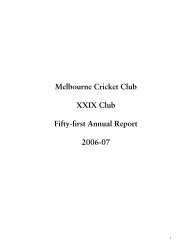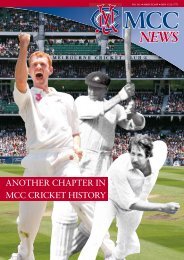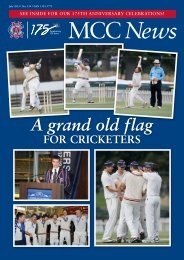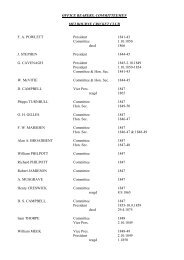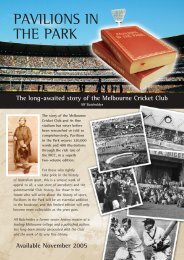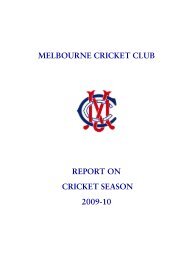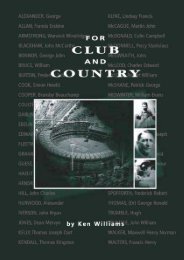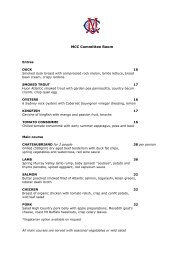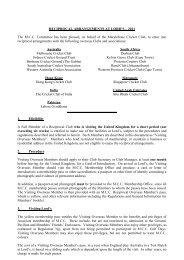Issue 36: Summer 2006/07 - Melbourne Cricket Club
Issue 36: Summer 2006/07 - Melbourne Cricket Club
Issue 36: Summer 2006/07 - Melbourne Cricket Club
You also want an ePaper? Increase the reach of your titles
YUMPU automatically turns print PDFs into web optimized ePapers that Google loves.
BOOK REVIEWSPonting, Ricky withMurgatroyd, BrianAshes Diary 2005: From Victory in Indiato the most dramatic Test series of thecenturyHarper Collins: Sydney, 2005ISBN: <strong>07</strong>32281520For many Australian cricket fans, the 2005 Ashes Series left aperpetual heartbreak. Ricky Ponting provides a very personalaccount of this memorable period as captain of the Australianside. Beginning with the Sri Lankan Top End Tour in June 2004,the Ashes Diary 2005 gives insights into Ponting’s county cricketdebut with Somerset in England, as well as the Videocon Cup andICC Champions Trophy. Ponting expresses his disappointment atmissing the majority of Australia’s victorious Test tour of Indiaas a result of a fractured thumb. Also well accounted for are thefollowing tours of New Zealand and Pakistan in Australia, theTsunami match, the VB series with the West Indies and Pakistan,and the Test and one-day tour of New Zealand that also includedthe first Twenty20 international.The most significant piece from The Ashes Diary 2005 is thatwhich focuses on the dramatic Australian tour of England in thesummer of 2005. The past year had been leading up to this pointand Ponting portrays his anguish of the inevitable loss of theAshes to England. Ponting gives a candid response to the failuresof Australia which led to the loss of the Ashes. It is interestingto note the high praise he gives his fellow Australian teammatesthroughout Ponting’s reflection. At the same time he givesemphasis to the dramatic tie in the NatWest Series and victory inthe NatWest Challenge. Also included is an in-depth section ofthe 2004/05 statistics period, compiled by Ross Dundas.The Ashes Diary 2005 is the third contribution by Ponting ascaptain of Australia and provides a valuable account of eventswhich led to the Ashes clash and arguably the most dramatic TestSeries of the century. It is a captain’s story with notable highs, yetwill be most known for its dramatic lows. It is a considerable readfor any cricket lover, a delight for whichever side of the fence youhappen to be on. It also provides a nice curtain-raiser to the much-anticipated <strong>2006</strong> Ashes Series.Nathan CaddenPonting, RickyCaptain’s Diary <strong>2006</strong>: Australia’s Road tothe Battle for the AshesHarper Sports: Sydney, <strong>2006</strong>ISBN 10: 0 7322 8153 9ISBN 13: 978 0 7322 8153 3The fourth in Ricky Ponting’s diary series, the <strong>2006</strong> version (coauthoredby Geoff Armstrong) covers the period between October2005, when a World X1 visited Australia, and April <strong>2006</strong> whenthe short tour of Bangladesh concluded. During this 25-weekperiod, the Australians played 25 One Day Internationals, 12 Testsand two Twenty/20 Internationals. Thirty players were used andthe matches were played in four different countries. Only sevengames were lost, none of them Tests, a formidable record forany captain.In the first section of the book, Ponting looks back to the difficultperiod following the loss of the Ashes. He arrived home to theinevitable speculation about his role in the defeat, Dennis Lilleeleading the charge and nominating Shane Warne as a betterproposition if the Ashes were to be regained. Ponting admits thathe was hurt by the criticism, but could not afford to overreact.Unfortunately he doesn’t spend enough time on his personalresponses to the criticism, instead shifting the discussion to thereview of the team’s performance carried out by <strong>Cricket</strong> Australia.It is all just a bit too bland, a characteristic which, unfortunately,is typical of this genre. For example, statements such as: “I havealways said that if we can focus on things we can do, rather thanworrying about outside things that are beyond our control, we cancompete with any team in the world”, become rather tedious.The main problem with the book as a whole is that the diaryformat is followed religiously. Every game is commented on inat least some detail. Even the most creative of observers wouldfind it difficult to find something of real interest to say abouteach of the 25 one day games Australia played during the periodcovered. Ironically, although Ponting gives his personal thumbsdown to the concept of Twenty/20 cricket at the internationallevel, the short chapter spent on the game in Brisbane againstSouth Africa is of comparative interest, if only because it issomething a little different.Perhaps the subtitle of the book gives the game away. After theAshes were lost in one of the finest series ever played, everythingthat happened in the 18 months before the return clash inAustralia was going to be seen as a prelude. The series againstSouth Africa began with plenty of hype, but the reality was thatthe best they could do was force one draw in the six Tests played.The severely undermanned West Indians were never going toprovide a real contest and Jason Gillespie scored a double centuryagainst Bangladesh. One hundred and thirty pages are allocatedto coverage of the Test matches. The final 86 pages contain thescore cards from every game played, as well as the averages foreach series. The next diary should be more interesting.Denis CarrollThe Yorker - <strong>Summer</strong> <strong>2006</strong>/<strong>07</strong>



